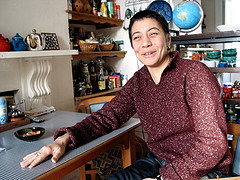Bird of Night Gets Shot Down
 The Royal Opera House presented another new opera last month, Bird of Night. Dominique Le Gendre, the composer, was born in Trinidad, and Paul Bentley's libretto is set there, in the 1950s. Here are a few reviews, beginning with a fairly positive one by Michael Church (On the wings of desire, October 23) for The Independent:
The Royal Opera House presented another new opera last month, Bird of Night. Dominique Le Gendre, the composer, was born in Trinidad, and Paul Bentley's libretto is set there, in the 1950s. Here are a few reviews, beginning with a fairly positive one by Michael Church (On the wings of desire, October 23) for The Independent:
If the music intermittently echoes Britten's A Midsummer Night's Dream, the staging evokes Judy Garland and the Yellow Brick Road, and in Betsabee Haas they have a suitably wide-eyed and impulsive performer in the main role. Her top notes may disappear, but she sings with such sweet characterfulness that criticism is disarmed. Le Gendre is a skilled orchestrator with a knack for combining strings, harp, and marimba, and has a sensitive feel for the human voice; she can bring the auditorium to stilled rapture with a pastiche Negro spiritual, or galvanise it with a genuine Cuban groove.If some readers of Ionarts accuse us of being mean, take a look at Richard Morrison's demolition job (Bird of Night, October 23) for The Times:
Meanwhile, Le Gendre's librettist, Paul Bentley, deftly mingles Creole locutions with brightly coloured literary extravaganzas. So why does this production, despite its megawatt charm, and despite the heroic performances of its orchestra and cast - notably Paul Whelan and Andrea Baker, as the heroine's father and godmother - disappoint?
What a waste of time, talent and taxpayers’ money this tosh is. Not so much a bird of night, more a lumbering turkey. In part I blame some of my gentler colleagues. Had critics not been polite when Dominique Le Gendre’s opera (in its original 20-minute version) was premiered three years ago, as part of a night of pieces by black composers, the Royal Opera would not have commissioned this mind-numbing two-hour extension.It does not get better after that. Next, we have Warwick Thompson ('Bird of Night' Is Hobbled by Patchy Libretto, Plodding Score, October 20) for Bloomberg News:
But Covent Garden must bear the brunt of the blame for making an extraordinary misjudgment: that the Trinidad-born Le Gendre possesses anything like the level of technique or inspiration to sustain a full-length opera. What we got here were muddy harmonies that had no onward thrust, melodies that didn’t impinge on the consciousness even while they were being sung, vocal lines that constantly seemed too high or low for the singers who had to deliver them, choruses that sounded weedy and ill-blended, clunking hiatuses that clobbered what little dramatic impetus there was on stage . . . and, worst of all, a feeling that there was no compelling reason why any of this was being set to music at all.
Now the minus side. The climaxes are dramatically clogged, and much of the motivation is tangled. Desiree flip-flops confusingly between desiring to kill and then not kill Appolline, and Appolline's father offers only the most implausible of reasons for wanting his daughter to go and live with the evil Diego. [...] This absence of characterization might have been strength if Le Gendre's score had supplied musically what the words lacked. That, after all, is the secret of great opera.Even Erica Jeal in The Guardian (Bird of Night, October 21), where the politics are at least predisposed toward a black woman composer, is polite but negative:
Instead her resolutely pleasant, deliberately naive, and very tonal sound world -- with an over-reliance on vibraphone and glockenspiel effects -- feels like underscore. Without an independent musical logic of its own, and without a clear story to tell, the danger of plodding is frequent.
It would be lovely to report that Bird of Night, the first full-length opera by Trinidadian composer Dominique le Gendre, is a roaring success. Not only is it the first Royal Opera commission from a woman - not the shocking evidence of sexism it might seem, yet still a milestone - but it is also the first whole-evening piece to have emerged out of A Nitro at the Opera, the ROH's 2003 programme of 20-minute works by black composers. The funding, the workshops and the sheer good intentions that have gone into its expansion should have created the ideal conditions for a new opera's birth. However, they clearly haven't. [...] During all those workshops, did nobody realise that Bird of Night was developing into a bit of a dodo?Ouch. I believe that is a swing and a miss.





















































No comments:
Post a Comment